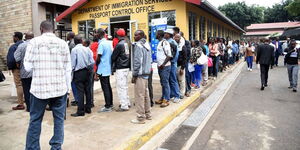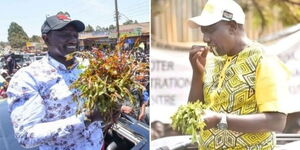The Kenya Wildlife Service on Monday, April 14, detailed how four suspects, including three foreigners, almost managed to smuggle 5,000 queen ants worth Ksh1 million.
Through a statement, KWS, while condemning the act, revealed that the suspects, who were arrested on April 5, had concealed the ants in specially modified test tubes and syringes, terming the incident as an “act of biopiracy.”
“This case not only marks a serious wildlife crime but also constitutes biopiracy, as it involves the unlawful access and attempted export of Kenya’s genetic resources without prior informed consent or benefit-sharing, in direct violation of national law and the Nagoya Protocol on Access and Benefit-Sharing,” KWS stated.
KWS further revealed that the test tubes had been designed to sustain the ants for up to two months and evade airport security detection, including X-ray scanners.
In addition, cotton wool was used to maintain the ants’ survival during transit, indicating a premeditated and well-executed trafficking operation. According to the wildlife service, the suspects had entered Kenya on tourist visas.
“According to intelligence reports, the suspects intended to smuggle the ants to high-value exotic pet markets in Europe and Asia, where demand for rare insect species is rising,” KWS disclosed.
Queen ants are highly valuable, with common species going for between Ksh200 and Ksh1,000, while the larger, rarer species fetch between Ksh1,500 and Ksh5,000. Highly exotic or difficult-to-catch queens sell for between Ksh6,000 and Ksh15,000.
The intercepted ants are prized by collectors for their unique behaviour, complex colony-building capabilities, and greenhouse pest control. These traits make them popular in formicariums—artificial ant habitats—driving their illicit trade and illegal removal from the wild.
KWS highlighted the act of smuggling native species as a growing global threat that not only undermines Kenya’s sovereign rights over its biodiversity but also deprives local communities and research institutions of potential ecological and economic benefits.
The wildlife service raised the alarm over a shift in trafficking trends—from iconic large mammals in the past to the present day, where lesser-known yet ecologically critical species are the most sought after.
To that effect, KWS issued five demands, calling for urgent and multi-pronged responses. These included enhanced surveillance at airports and exit points, incorporating advanced scanning technologies to detect concealed wildlife. It also called for public awareness campaigns targeting courier services, logistics providers, and travellers to identify and report suspicious activities.
Further, research partnerships to understand global demand and the ecological implications of illegal species removal were deemed key. Community sensitisation initiatives to safeguard local biodiversity from exploitation would also help curb the growing menace.
Stronger monitoring at borders and conservation areas to disrupt wildlife and genetic resource trafficking networks was another demand issued by KWS.
The four suspects pleaded guilty to the offence after arraignment at the Jomo Kenyatta International Airport Law Courts, following their arrest at a guest house in the Lake View area of Naivasha, Nakuru County.
They were charged with dealing in wildlife species without a permit, contrary to Section 95(c) of the Wildlife Conservation and Management Act, Cap 376, Laws of Kenya.












